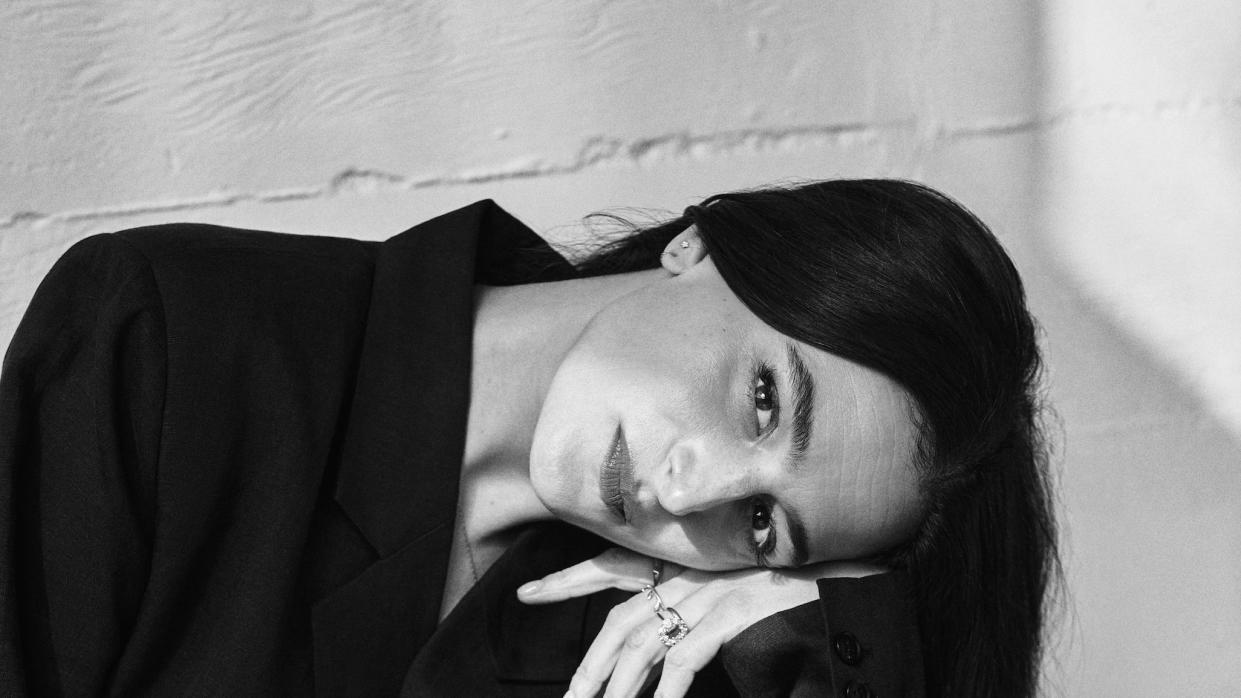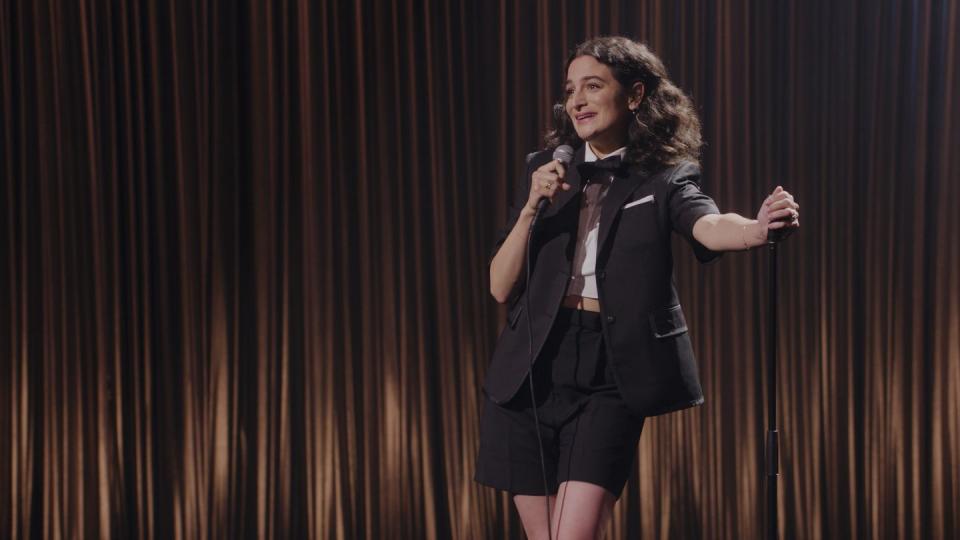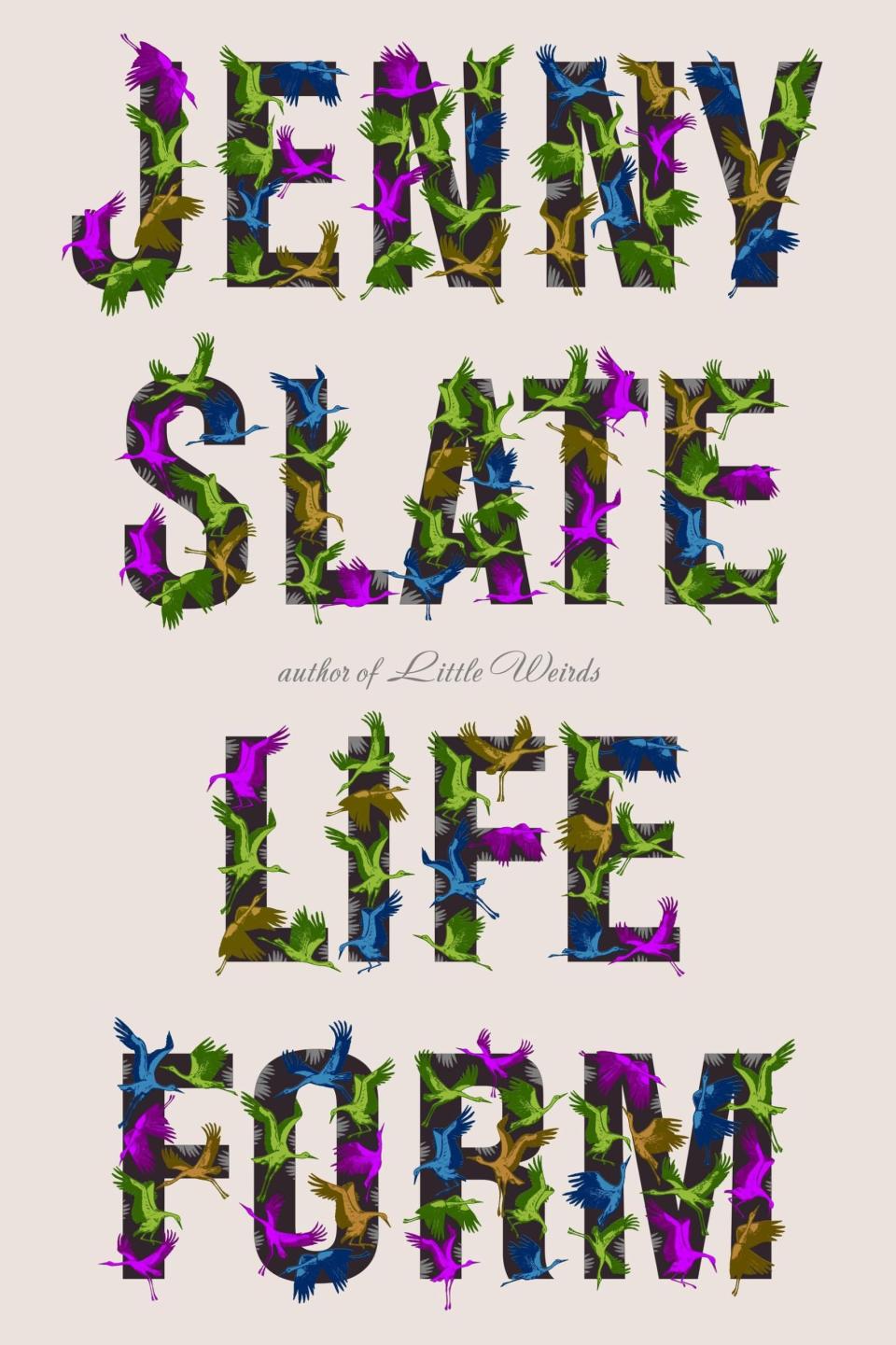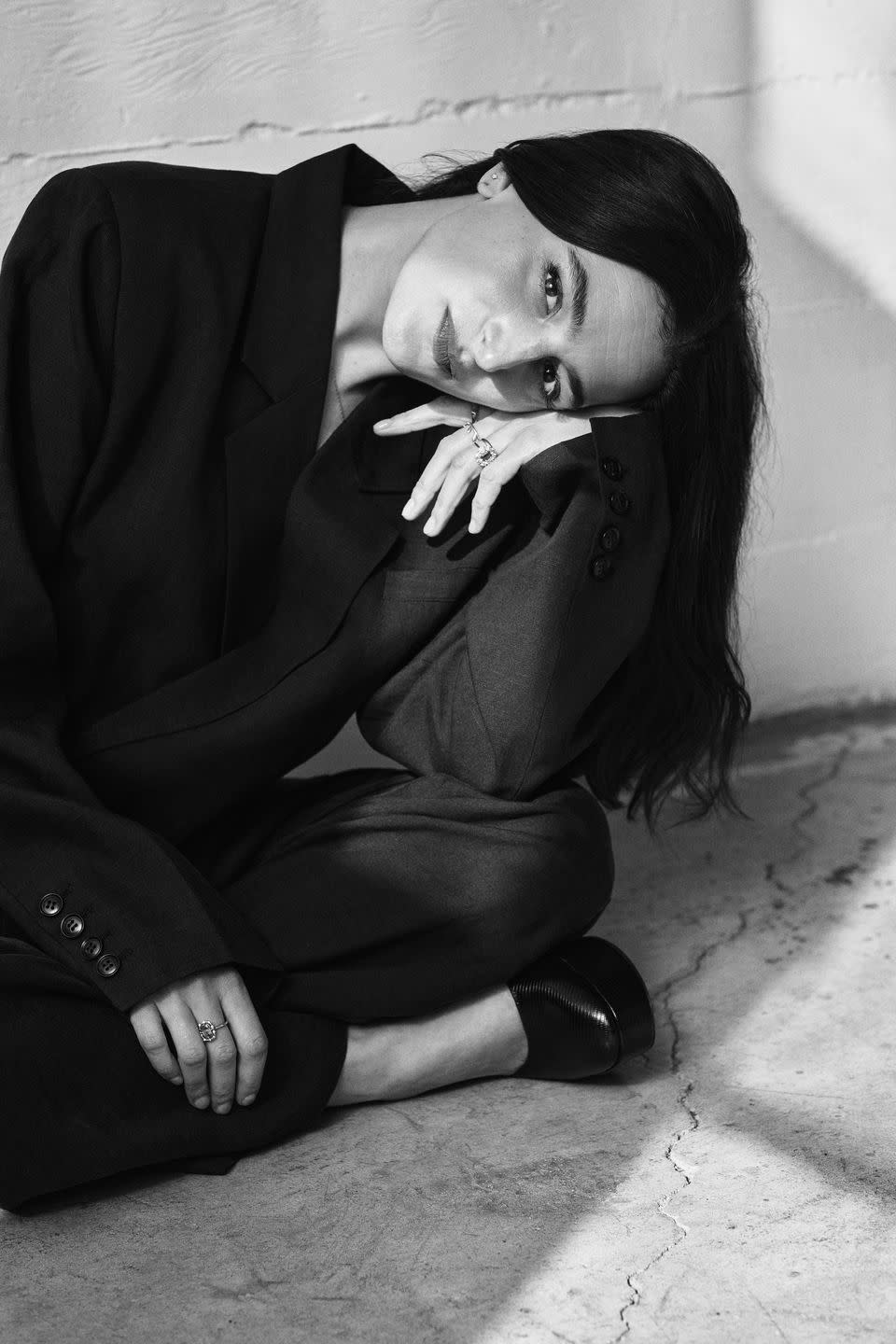Jenny Slate Is All Grown Up

- Oops!Something went wrong.Please try again later.
"Hearst Magazines and Yahoo may earn commission or revenue on some items through these links."
Jenny Slate is no stranger to getting personal. Whether it’s in her work as a comedian and actor, as co-creator of Oscar-nominated 2021 animated film Marcel the Shell With Shoes On (which she’s called “the closest portrait I feel like I could make of my own psyche”), or as the author of two books of essays (the second, Lifeform, will be released in October), she is constantly turning over and examining herself and her place in the world in offbeat, evocative ways.
Her latest stand-up special, Jenny Slate: Seasoned Professional, is no exception. Within minutes of joyfully bounding onstage and declaring her intention to “share as much as possible without going to jail,” Slate is going there. From describing her nipples during breastfeeding in great detail, to her embarrassment over being asked to audition for the role of It’s Pennywise the clown, to her need to get close to her therapist, she takes the audience on a journey that is as raw as it is raucous. In anticipation of the special’s debut this week on Amazon Prime Video, Bazaar spoke to her about getting dressed for the occasion (in Thom Browne, like a true seasoned professional) and marking the waypoints of her life with comedy.
The first thing we see in most comedy specials is the comedian walking onstage. In your new special, you walk on wearing an immediately striking tuxedo-and-shorts combo. What was the thought process behind that outfit?
Ah, that’s such a nice question. No one’s asked me about what I wore, and I care so much about it. I feel that I have arrived—I mean, my special is called Seasoned Professional—and I’ve arrived at a moment in my career where I feel really developed. As a person, I’m still such a doodad and a squiggle and a system of weird geysers, but as a professional, I feel an old-fashioned sense of being seated at the adults’ table. I’m happy about it, and wanted to embrace it.
I’ve been trying to figure out how to dress onstage. For a long time, I dressed sort of how I would dress for a date. And I think that’s nice, because it conveys this feeling of: We’re all hopefully going to crush on each other a little bit tonight. That’s a really great energy to try to play into. But when I thought about what I had worn over the past year that made me feel both as peppy as I am, but also as fully formed as I am in my own understanding of my identity, I thought about a time I had worn this little Thom Browne tuxedo with shorts. I remember putting it on and thinking, “I’ve never felt better. I’ve just never felt better.”
I felt at once very classy, but also so bold. The pigments of it were so strong: black and white. It’s so clear. Whereas I myself am such a wash—I’m a watercolor; I’m many colors. On the inside, there’s so much going on. So I’ve realized that it’s better for me at this point to dress in a more contained and structured way on the outside. For this special I asked, “Do you think that [Thom Browne] would let me have one to wear onstage?” They sent a bunch of little, little tuxes to my house, and I chose the one that suited me best.

Was there a practical purpose to it? You move around a lot onstage and at one point make a joke about doing dressage. Did you consider the need for mobility in whatever you wore, even if it was suiting?
Oh, for sure. There’s no way I’m showing up in, like, high heels! I can’t! I've been thinking about this for a long time: My husband and I watched Taylor Swift’s Eras Tour at home, and my jaw was on the floor. It’s like watching a figure skater do only the jumps for three hours. I kept asking, “How can she be at 100 percent for so long? How does she go up and down all those stairs? How is she still in those high heels?” Oh my gosh, I couldn’t even believe what a feat it was in every way. But I know this interview isn’t about that; I know I should be talking about my own work. [Laughs.] First of all, no one’s asking me to do an arena tour. But even when performing in my own small way, I have to wear flats—of course!
For the special, I wanted to move around freely and I didn’t want to get really sweaty. The jacket was short-sleeved; the pants were shorts. I loved that the shirt was a crop top, and it might have been sleeveless underneath, too. So the suit was a really great combination of everything I needed.

Lifeform, by Jenny Slate
amazon.com
$28.00
You start the special by saying you want to “share as much as possible without going to jail.” How do you mine comedy out of the idea or act of oversharing?
I actually don’t think of it as oversharing, because I’m sharing it all on purpose. I’m not uncomfortable with the subject matter at all—in fact, I’m celebrating it. That’s why it’s there. I’m telling the audience, “This is my best shit. I’m bringing you everything!” Not just my best material, but what I’m interested in the most.
So for me, that line is a disclaimer for the audience: This is going to be be personal. And although I’m wild, I’m not out of control; I’m a professional. I’m flying the airplane, and I’m going to do a bunch of loop-de-loops and dives, but I know how to fly the plane. The ride isn’t gonna be that long, and no one’s gonna get sick. You’re just gonna get a thrill. I gotcha.
At one point, you reference a bit from your previous special, in which you considered giving up on dating and turning your “vagina into a museum with a great alarm system.” Since then, you’ve gotten married and had a child. When you’re preparing for a new special, do you ever watch your older stand-up and reflect on it?
No, no, no. I don’t tend to watch my work very much. I’ll watch it once the edit is almost done to make sure that I like it, but once it’s done, I don’t want to watch it again. I just want to move on. But a few things got cut out of my last special, and I couldn’t remember what had made it. Sometimes there are tiny statements or jokes that just serve as transitions, the kind of things that over 15 years of doing stand-up become the equivalent of saying “Anyway … ” or “Listen … ” you know? I wanted to make sure that I didn’t repeat anything like that from my last special. So I watched the special again, and I thought, That’s how I ended it?
And it made me think, if anybody watched that special and then watches this one, and they see me talking about the timeline of my life, it would be worth acknowledging it. I wanted to admit: Back then, I thought it might be viable for me to just be a weird aunt who gives up on dating and has a vibrator and occasional lovers. I told you that I was sold on that idea, and it was how I felt at the time. But then I met my husband and I was like, “No, I don’t want to do that! I want this! I want this man. I want him to be my boyfriend, and then I want him to be my husband forever.” I wasn’t lying before; I just changed my mind. The person that you saw onstage then is the same person onstage now.

You also have an aside about how the idea of a women being “chill” was something “misogynists invented to make us feel like we shouldn’t have needs.” How did that realization manifest in your real life?
I credit Gillian Robespierre, who directed the special, and Elisabeth Holm, who produced it, with what felt to me like a feminist awakening. I first met them when they made [2014 film] Obvious Child, which was my first full-fledged acting job, the first time I was the lead in a movie. Gil and Liz made me realize that I had to unlearn a lot. And I think that if you’re lucky in life, you find someone who can help teach you that. Then you start to draw out your own internalized misogyny, which goes hand in hand with identifying misogyny in the world at large, figuring out how to just navigate it, react to it, and reduce it.
Then at the end of my 30s, I felt a real hunger for self-acceptance and asked myself what that self-acceptance would look like for me. Obviously, that’s going to be a lifelong practice. I’m not saying, “Did it! Done!” [Laughs.] But there was a noticeable acceleration in the process of becoming the one to tell myself who I am. I think I’m very understanding; I think I’m open and kind. But am I “chill” in the face of anything? No! Of course not! That’s a gnarly, impossible, brutal goal. I’m not involved in that deal. That is a bad deal.
You do a lot of voice acting, notably as one of the leads on Fox’s The Great North, created by two writers from Bob's Burgers, which you also have a recurring role on. The shows are known for their positive, comforting tone—to the point where a common practice among fans is to fall asleep to them. Have you heard that a lot?
Oh, for sure. Lots of people tell me that they love both shows. It’s always such a happy moment for me, because you’re right, those shows are full of goodness and sweetness—but there’s no compromise on the comedy. When we record, I laugh so hard. The Great North is so funny, but it’s never mean. I’m so lucky that I get to be there, because it reminds me that you really can work like that. That combination is real.
This interview has been edited and condensed for clarity.
You Might Also Like

